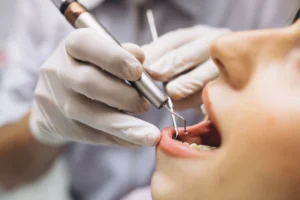TMJ (temporomandibular joint) disorders can cause pain and discomfort in the jaw joint and muscles that control jaw movement. Common symptoms include jaw pain, difficulty chewing, popping or clicking sounds in the jaw, and headaches. There are several factors that can contribute to the development of TMJ disorders, including teeth grinding, clenching, and misaligned teeth. In many cases, a night guard can help alleviate TMJ-related symptoms by providing a cushion between the upper and lower teeth and preventing them from grinding or clenching together. A night guard can also help align the jaw and relieve pressure on the TMJ, reducing pain and discomfort. If you’re experiencing TMJ-related symptoms, it’s essential to consult with your dentist to determine if a night guard or other treatments are necessary to address the issue.
In addition to wearing a night guard, there are several lifestyle changes you can make to reduce the risk of developing TMJ disorders. These include avoiding hard or chewy foods, practicing good posture, and practicing stress-reducing techniques like yoga or meditation. Your dentist can also recommend exercises to help stretch and strengthen the muscles in your jaw and recommend other treatments like orthodontics or dental restorations to address any underlying issues. By taking a proactive approach to your oral health and seeking treatment for TMJ disorders, you can alleviate pain and discomfort and enjoy a healthy, functional smile.











